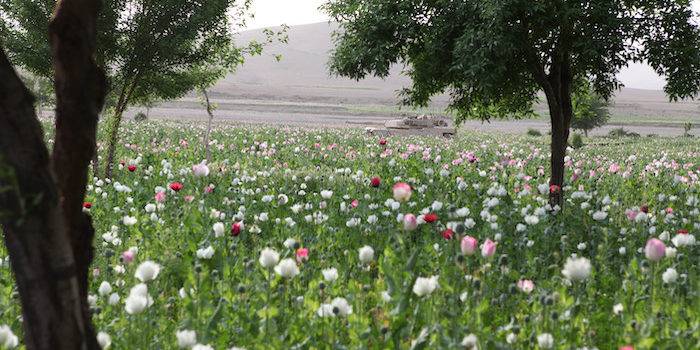(Ken Silva, Headline USA) Afghanistan was once the source of some 90% of the world’s black-market opium, but that supply has been drastically curtailed under the Taliban’s rule, according to recent research.
The U.S. government apparently thinks this is a negative development.
The U.S. Institute of Peace, which receives $55 million a year from Congress, published a paper last week that laments the Taliban’s successful war on drugs. The Institute of Peace argued that the short-term harms against Afghan farmers will outweigh the benefits of reduced opium production.
“Phasing out Afghanistan’s problematic drug economy will be essential over the longer term—not least to contain widespread addiction within the country,” wrote the institute’s “senior expert” on Afghanistan, William Byrd.
“But this ban, lacking any development strategy and especially at a time when the economy is so weak that displaced opium poppy farmers and workers have no viable alternative sources of income, is not the right way to start on that path.”
Byrd argued that the opium ban will hit Afghan farmers especially hard, given the billions of dollars of U.S. aid that are on longer available to them. He also argued that the opium ban won’t immediately result in a reduction of the world heroin supply, since many farmers are still selling their supplies from before the ban went fully into effect.
“The impact of the opium ban on drug supplies and prices in other countries, and ultimately in Europe, will not be immediate,” he said.
“After the 2000 Taliban ban, it took about 18 months to two years for the impacts to play out in Europe … in the form of effective price increases through adulteration of the purity of heroin on markets, which exacerbated risks to problem drug users from overdoses.”
However, others disagree with Byrd and the Institute of Peace—including those who did the actual research.
When presenting their findings, lead researcher David Mansfield called the opium reduction “unprecedented,” while former UK Drug Tzar and UN official Mike Trace said the long-term effects on the global drug market will be “significant.”
“A sustained reduction in poppy cultivation on this scale will have significant long-term impacts on the patterns of heroin trafficking and organized crime around the world, and also on patterns of consumption and addiction in the UK,” Trace said.
The U.S. spent more than $9 billion trying to abolish poppy farming during its 20-year occupation of Afghanistan. But the country’s share of global opium production rose from 70% to 90% during that time, thanks to the fact that America’s allies were drug lords.
Those drug lords included CIA asset Ahmed Wali Karzai, the half brother of U.S.-backed former Afghanistan President Hamid Karzai.
Then-Colonel Michael Flynn reportedly compared Ahmed Wali Karzai with Al Capone and said his removal from power would be necessary for the country—but Flynn was rebuked by U.S. generals, according to antiwar.com editor Scott Horton’s book on the subject, Fool’s Errand: Time to End the War in Afghanistan.
U.S. soldiers and marines reportedly said they had “no choice” but to guard poppy fields for local warlords.
Byrd and the U.S. Institute of Peace think those drug lords might fight back against the Taliban’s current opium ban.
“The political blowback within the Taliban from the ban, limited and manageable so far, thus may intensify if the ban continues to be seriously implemented into 2024,” Byrd concluded. “In addition to influential landowners, Taliban figures associated with the drug industry may increasingly weigh in or actively try to subvert the ban, at least locally.”
Ken Silva is a staff writer at Headline USA. Follow him at twitter.com/jd_cashless.

